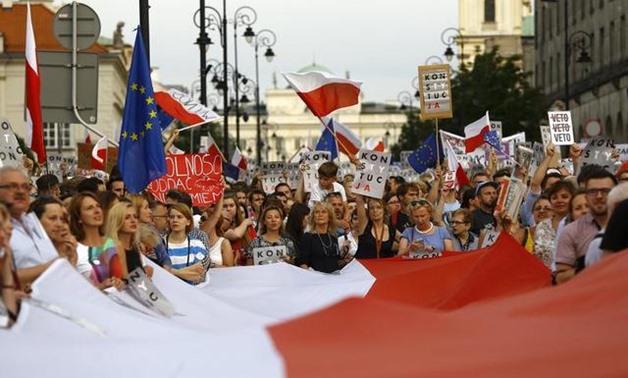
People attend a protest against judicial reforms in Warsaw - REUTERS
WARSAW - 24 July 2017: Polish President Andrzej Duda unexpectedly announced on Monday he would veto two of three judicial reform bills passed by parliament that have triggered nationwide protests and raised EU and U.S. concerns about a politicization of the courts.
Duda said the reforms, including a clear-out of Supreme Court judges, were in line with popular expectations, and that many Poles had grievances against the justice system.
"However, as the president, I could not accept them and I use the right of veto because they require changes that ensure their conformity with the constitution," he said, adding that he would shortly present his own reform proposals.
Duda is an ally of the ruling right-wing, eurosceptic Law and Justice (PiS) party and his move appeared to catch the government off guard, while drawing only a cautious response from Brussels.
The overhaul of the judiciary, coupled with a drive by PiS to expand its powers in other areas, including control of the media, has provoked a crisis in relations with the European Union and sparked one of the biggest political conflicts since Poland overthrew communism in 1989.
On Saturday, the upper house of parliament gave final approval to a bill that would remove all current Supreme Court judges immediately except those approved by the justice minister, who is also the prosecutor general.
Parliament had earlier passed a bill giving it the right to name most of the members of the National Council of the Judiciary, which would nominate future candidates for the president to appoint to the Supreme Court.
"I'm absolutely a supporter of this reform, but a wise reform," Duda said earlier, announcing his veto.
"Reform in this form will not increase the sense of security and justice ... Change has to be made in a way that doesn't separate society and state."
For days, tens of thousands of protesters have held candlelit vigils in cities including Warsaw, Krakow and Poznan, demanding that Duda veto the reforms. Protests continued on Monday outside the PiS headquarters and Duda's office in Warsaw.
The opposition and most legal experts say the changes violate the Polish constitution.
But the government has rebutted accusations that it is heading toward authoritarian rule. The PiS says the changes are needed to ensure courts serve all Poles, not just the "elites".
PiS lawmaker Jacek Sasin told state broadcaster TVP Info that Duda's decision "may mean that we will have to wait much longer for the reform".
"SURPRISED AND DISAPPOINTED"
PiS leader Jaroslaw Kaczynski declined to answer reporters' questions as he headed into a hastily convened party leadership meeting, but Deputy Prime Minister Mateusz Morawiecki said he was "surprised and disappointed".
Duda met Prime Minister Beata Szydlo as well as the speakers of the two houses of parliament on Monday afternoon, but no details of their meeting were immediately available.
The European Commission last Wednesday gave Poland a week to shelve the reforms, which Brussels says would put courts under direct government control. On Monday it reserved judgment on Duda's move pending a discussion at its next meeting, on Wednesday. A senior EU diplomat said it was not yet clear whether the amendments that Duda sought would be more than cosmetic.
The United States, Poland's most important ally in NATO, has also expressed concern over the proposed changes.
On Monday Germany's foreign office minister, Michael Roth, welcomed Duda's veto and said he hoped Warsaw would now ditch the reforms.
Polish opposition groups welcomed Duda's veto, but urged him also to reject a third bill which gives the justice minister the right to dismiss the heads of lower courts. The president signalled that he would approve this law.
Duda's vetoes can in theory be overridden in parliament, but this requires a three-fifths majority with at least half of all legislators present, which PiS and its coalition partners are unlikely to be able to muster.
The state news agency PAP quoted the speaker of the upper house Senate as saying there might be an additional sitting of parliament next week.
Anna Materska, a political scientist at the University of Warsaw, said Duda's decision to distance himself from a flagship PiS policy after previously appearing closely aligned to the party could mark a political watershed.
"What happened required courage, but the president was backed against the wall and had no other option. This is a key moment in the events of the latest months, maybe even years."
Poland's political turbulence helped to push its currency, the zloty, to three-month lows against the euro last week. Foreign investors welcomed the news of Duda's veto on Monday by pushing the zloty up about 0.5 percent.

Comments
Leave a Comment